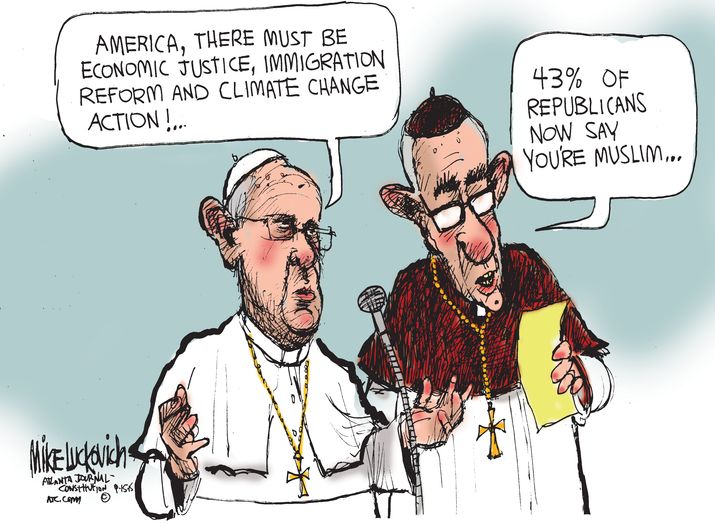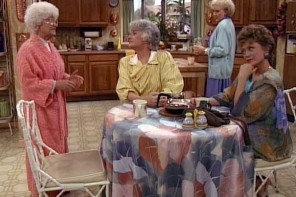Political satire aside, Pope Francis’ message is resonating with many in the Muslim American community. Before the leader of the Catholic world arrived in New York, a group of women at an Islamic center in Manhattan seemed just as excited to receive him as their Christian counterparts. “I love this pope!” exclaimed one. “Didn’t he wash a Muslim woman’s feet?” asked another. The lone voice of dissent in the crowd was motivated by reasons more practical than spiritual: “Traffic is going to suck.”
Pope Francis has just ended his first papal visit to the United States, which included stops in Washington D.C., New York City and Philadelphia. While the visit was of obvious significance for American Catholics, this pope has also earned the respect of believers of other faiths, including Muslims, with this repeated messages of inclusion, brotherhood and justice.
The papacy could not claim such a warm relationship with Muslims just a few years ago. Under Pope Benedict, relations were strained, particularly after he delivered a speech at the University of Regensburg in Germany in which he denounced Islam as a religion that uses violence as a means of coercing conversions. While Benedict later tried to repair relations with Muslims, he could never quite undo the damage his criticisms has caused. But the tide shifted after the election of Pope Francis in 2013.
Even as an archbishop of Buenos Aires, Pope Francis had worked closely with Muslim leaders– a leadership quality he carried into his papacy. “[He] is seemingly more accessible to diverse populations than not even just previous popes, but I think previous religious figures of any faith have been,” said Imam Khalid Latif, executive director of the Islamic Center at New York University.
When so many political and religious leaders treat Islam and Muslims like a looming threat, a man like Pope Francis is understandably a breath of fresh air for Muslim Americans. Francis has referred to the Qur’an as a “book of peace” and has prayed facing Mecca in Turkey’s famed Blue Mosque. He included Muslim men and women in his rite of washing feet as an act of humility. He invited an Argentinian Muslim leader to accompany him on his trip to Jerusalem and has recently asked for Europe’s churches to house Muslim refugees. Pope Francis seems to embody compassion, mercy, love and hope–qualities that are universally appealing and needed, so it is no wonder that he has become a uniting figure for people of all faiths.
The inclusive approach of Francis has endeared him to the Muslim community at a time when many Muslims in the United States feel vilified and alienated. Exclusionary rhetoric from Republican candidates has been seen all over the presidential campaign trail, from Ben Carson’s rejection of the idea of a Muslim president to Trump nodding in what appeared to be agreement to a questioner asking when and how the U.S. government could “get rid of” Muslims.
When many are trying to push Muslims out from the political realm in the name of faith, Francis’ contrasting approach as the leader of the Catholic faith is all the more significant. His visit to America was dotted with inclusive acts towards Muslims. He began a prayer service in St. Patrick’s Cathedral in Manhattan, by addressing his “Muslim brothers and sisters,” wishing them a happy Eid and praying for the hundreds killed during the Hajj. “I unite myself with you all,” he said. And, on Sept. 25, he held an interfaith service at the National September 11 Memorial & Museum in New York. The service featured several prominent Muslims: Dr. Sarah Sayeed, an adviser in Mayor Bill de Blasio’s Community Affairs Unit, and Linda Sarsour, director of the Arab American Association of New York, and of course Latif. The inclusion of Muslim representatives at a service at Ground Zero is particularly meaningful. “He’s coming here to push a message of peace,” said Latif. “No religion owns peace but every religion promotes it.”

For Latif, the papal visit and Muslim participation in it is significant for all people of all faiths. “For a moment to be able to stand with people who are different from you, in a world that tells you that you shouldn’t be getting along… is very important to see.”
Zehra Rehman is a freelance journalist and is pursuing a graduate degree in International Relations and Journalism at New York University.
Photo credit: DailyMail





